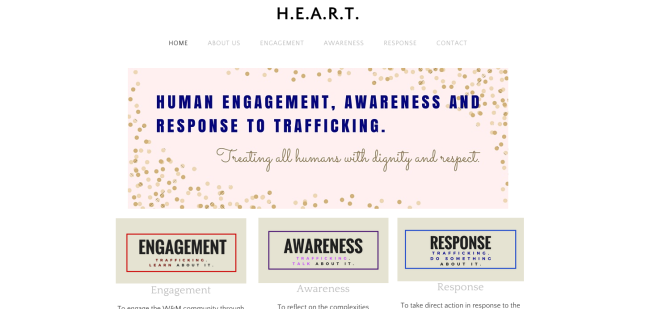HEART, which stands for Human Engagement, Awareness and Response to Trafficking, is a new organization on campus that brings the goal of raising awareness for human trafficking to the College of William and Mary.
The formation of this organization came weeks before the Super Bowl, which is known internationally as one of the worst days for sex trafficking. Last year, the San Francisco Chronicle reported that the Federal Bureau of Investigation set up a special center to combat increasing reports of sex trafficking around the site of the 2016 Super Bowl.
Led by Roselyn Buensuceso ’19, Jessica Davis ’18, Elena Gaffney ’19, Florence Glynn ’19 and Christine Kim ’18, HEART teaches students about the international and intersectional issue of human trafficking and what students can do to combat it. The club’s founders met on a Branch Out trip during spring break in 2016.
Human trafficking is the exploitation of people in vulnerable situations to extract labor from them without compensation,” Davis said.
“Human trafficking is the exploitation of people in vulnerable situations to extract labor from them without compensation,” Davis said.
According to Polaris, a national organization dedicated to combatting human trafficking, there have been 22,191 reports of sex trafficking within the United States since 2007. In 2016, one in six runaways were likely to have become victims of sex trafficking.
Human trafficking does not only involve sex trafficking and is not an issue that affects women exclusively. The International Labor Organization reports that approximately 14.2 million people are engaged in forced labor in agriculture, construction, domestic work and manufacturing industries. It is a $150 billion industry that operates in global and domestic markets.
“Women statistically do make up the majority, but it is a male problem; It goes across the gender spectrum,” Gaffney said. “There are people that are genderqueer, people there [who] are transgender, people of all different backgrounds, orientations, genders that are involved.”
HEART intends to educate members of the club and the student body about how human trafficking is an issue that relates to everyone.
“When you go on to the world, whatever profession you may go into whether it is anti-trafficking or not, having basic understanding and complex understandings of the way in which systems of human exploitation occur is very important,” Davis said. “So that when you see legislation about it you’re able to think critically about how that legislation is good, bad, would affect people, would not affect people, so that you can be a more informed citizen.”
According to members of HEART, human trafficking is a problem that is overlooked in discussions regarding contemporary social issues because of its negative connotation. Issues like prostitution fall under the category of human trafficking, and HEART plans to talk about this to break stereotypes regarding the industry.
“Human trafficking has such a stigma around it that it’s brushed under the rug,” Buensuceso said. “Prostitution is something that no one really talks about. If you see a prostitute standing on the corner, you don’t think about the factors that led that person to stand there … It’s something that no one really takes the time to understand.”
Gaffney said that she hopes to educate people about issues of trafficking, prostitution and rape.
There’s an image, you know, like for me it’s the fishnet tights and the standing on a street corner and the gaudy makeup that looks kind of like a clown,” Gaffney said.
“There’s an image, you know, like for me it’s the fishnet tights and the standing on a street corner and the gaudy makeup that looks kind of like a clown,” Gaffney said. “I think that somewhere along the line sex, prostitution, things like that have become these really dirty words with these crazy connotations and like this idea that like if you’re a prostitute you’re a bad person and you put yourself there.”
Along with raising awareness about human trafficking, HEART plans to reach out to victims and support them through their transitions out of the industry. According to Gaffney, survivors often struggle with the U.S. legal system and have a hard time establishing a normal lifestyle.
“For a lot of survivors, they’re the ones being criminalized, not the pimps, which is the problem,” Gaffney said.
The founders of HEART saw a hole in the College’s campus and wanted to fill it with an organization dedicated to eradicating stereotypes and raising awareness for a domestic, international and cross-dimensional issue.
“We’re trying to raise awareness about all of the facets of human trafficking and the intersectional issues as well as sexual assault, domestic abuse, homelessness, all these different issues that come together to create this issue,” Glynn said.
Members of HEART also hope to expand the work of their organization into the City of Williamsburg. They plan to organize drives to donate feminine hygiene products, groceries and clothes to victims of trafficking. They also plan to provide resources for students to learn about companies that do not use victims of trafficking to produce their goods. HEART also intends to reach out to Latisha’s House Foundation, an anti-trafficking organization in Williamsburg.





























